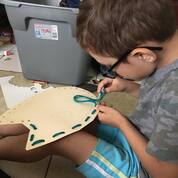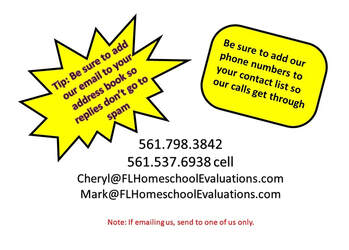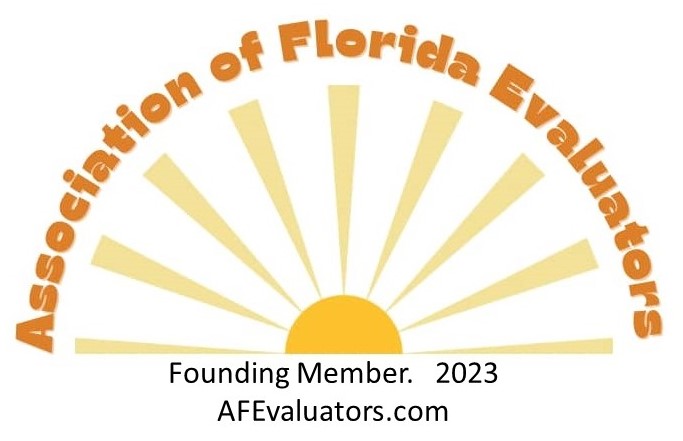|
Homeschooling in Florida:
Getting Started Options
Florida has a few options for learning at home-- currently, legally, the only options in which a parent directs the child's education are the home education program and the new (as of July 2023) Personalized Education Program: 1. Home education (homeschooling) or 2. Florida private school (aka FL umbrella school) or 3. Full-time tutoring program (a variant of public schooling) 4. Full-time public school programs (a variant of public schooling) 5. Personalized Education Program (PEP)--this is only for those approved for the Florida Tax Credit scholarship--this option should be similar to home education but with a few fundamental differences. |
Florida is a very homeschooling-friendly state with laws that are mostly designed to allow parents to educate their children without interference from school district officials.
Some record-keeping and reporting is required; this is meant to confirm that children are being educated and are not truant, rather than to control how parents are educating their own. For example: 1. Parents are allowed to use any methods or materials to teach their homeschooled children. The state does not have a list of specific subjects that must be taught and gives parents much freedom as long as they keep records and the children are making educational progress commensurate with ability (i.e., learning). 2. Children who graduate high school as home education students are recognized, under Florida law, by Florida colleges as high school graduates if the parent signs an affidavit of completion. 3. Home education high school students can take college courses, free of cost, through the state's dual enrollment system contingent on test scores. Many have graduated as homeschooled high school students with two-year college degrees. |
Ready to begin?
For a child
A. Enrolled in a Florida school: You need to officially withdraw the child if your child is enrolled in a school. Get proof, in writing, that you've done this to avoid issues with truancy if the school does not remove the child from their rolls and counts the child absent.
Emailing the school a copy of a signed letter of intent to home educate a child, at the same time as you send the letter of intent to the school district, is one way to notify a Florida public school.
Consider beginning with a period of "deschooling" first (not quite the same as "unschooling") to get away from some of the negative attitudes the child may have associated with schools.
B. New to Florida: Start the registration process within 30 days of moving to Florida, buying or renting a home, or taking a job in Florida, or otherwise establishing physical residency.
A Florida address is required to register in Florida.
Proof of residency, a Florida driver's license, a copy of a lease or mortgage, etc. are NOT required to register a home education student.
Florida record-keeping requirements begin once you move here--no matter the time of year.
C. Starting school for the first time: The child needs to be registered in an official educational program this school year if the child will be six years old by Feb. 1st of this school year.
If a child has a birthday from Feb. 2nd-early August, the child will not need to be registered until the fall when the child is already six.
These requirements are not based on grade levels but on compulsory attendance ages in Florida law.
A. Enrolled in a Florida school: You need to officially withdraw the child if your child is enrolled in a school. Get proof, in writing, that you've done this to avoid issues with truancy if the school does not remove the child from their rolls and counts the child absent.
Emailing the school a copy of a signed letter of intent to home educate a child, at the same time as you send the letter of intent to the school district, is one way to notify a Florida public school.
Consider beginning with a period of "deschooling" first (not quite the same as "unschooling") to get away from some of the negative attitudes the child may have associated with schools.
B. New to Florida: Start the registration process within 30 days of moving to Florida, buying or renting a home, or taking a job in Florida, or otherwise establishing physical residency.
A Florida address is required to register in Florida.
Proof of residency, a Florida driver's license, a copy of a lease or mortgage, etc. are NOT required to register a home education student.
Florida record-keeping requirements begin once you move here--no matter the time of year.
C. Starting school for the first time: The child needs to be registered in an official educational program this school year if the child will be six years old by Feb. 1st of this school year.
If a child has a birthday from Feb. 2nd-early August, the child will not need to be registered until the fall when the child is already six.
These requirements are not based on grade levels but on compulsory attendance ages in Florida law.
Register the child using ONE of Florida's homeschooling options
|
Option 1: Home Education
This option is the original one that the state considered "homeschooling" and for which parents direct the education.
Parents are responsible for keeping records, deciding learning materials, grade levels, and more. Parents have guarantees from the state that their children will not be bothered by truancy officers and will be accepted as high school graduates by Florida colleges, can participate in the free college dual enrollment system, and more. This option was put in place in the 1980s to fix issues in the unofficial umbrella school option. 1. Letter of Intent Send a Letter of Intent (aka Notice of Intent) to the local school district's Home Education Liaison Keep a copy for your records! The date of the letter is the deadline for future evaluations. As of October 2020, districts are required by Florida Dept of Education Office of Choice policy to confirm receipt of letters of intent. 2. Portfolio Florida laws require parents to keep a record of their child's learning. The records, called a portfolio, must include *a Log of Educational Activities with *titles of reading materials & *samples of work These aren't defined in Florida law so the parent can decide the format and level of detail. For more information on required records and examples, go to our portfolio page. 3. Annual Evaluation
Once a calendar year, turn in proof that the child is making educational progress commensurate with ability (i.e., learning). We offer low stress portfolio-review evaluations. The parent can choose from 5 options:
FIVE Evaluation Options
State Testing
Must be set up in advance with the child's zoned public school. Most will want to be contacted by January. This testing is free of cost and done at the local zoned public school in public school classes with public school students according to the school's schedule. Results are submitted automatically, so there's no "do over" option if something goes wrong. A score above the 35th percentile is considered passing. This is the only option where the parent had no control over the evaluator nor whether the results are submitted.
Testing with a Psychologist
Testing may be done with a psychologist. This option can be expensive. The testing done is up to the psychologist--the law doesn't provide specifics. This method is usually used with children who are seeing a psychologist for other reasons--such as testing for giftedness or learning disabilities.
Nationally-normed Achievement Testing
Must be administered by a certified teacher--most districts understand this to mean a FL certified teacher. Such tests will compare your student's scores to those of other students across the country. The California Achievement Test, the Iowa Test of Basic Skills, or other such tests are often given in group settings by homeschool support groups (though this has not been as common during the pandemic) and typically cost $50-$120 a test. A score above the 35th percentile is considered passing.
Portfolio Review Evaluation
This is the type of evaluation we typically offer.
The portfolio review is NOT a test nor based on a single event; rather, it is based on the records of the child's work during the past year. This is a low-stress evaluation as the student is not required to perform for the portfolio review. The student must speak with the evaluator but this is a brief chat about the progress seen--making sure the student is aware of the learning that's been going on. This type of evaluation must be done by a Florida certified teacher with regular (i.e., professional-level) certification in some grade level between K and 12. We have been doing such evaluations since 2003 for students, of all ages and ability levels, across Florida. Anything else the parent and district agree on
Some parents have gotten their district to accept grade reports from FLVS or dual enrollment program under this option. Some districts have accepted testing that was not administered by a Florida certified teacher through this option. Feel free to suggest other options.
Can school districts add requirements for home education?
No, state law forbids districts from adding additional requirements UNLESS the student participates in a public school district program.
But school districts may vary in the additional options they approve for evaluations. What does the law or district require for curriculum?
State law does not allow districts to set curriculum requirements for home education or private school students. The parent running a home education program may use any methods or materials appropriate for their child.
What are Florida's required subject areas?
Florida law requires sequentially progressive instruction (that lessons gradually grow more advanced) and educational progress commensurate with ability (learning). Home education students and private school students are not required to copy what Florida public schools are currently teaching. No required subjects are listed.
May homeschooled students participate in public school extracurricular activities?
State law's Craig Dickinson Act gives home education students the right to participate in high school (defined as grades 7-12 in law) activities.
How will my high school student get a diploma if homeschooled?
Parents running a home education program can issue a diploma. Homeschool parents can participate in FPEA.com's annual graduation ceremony in central Florida and get a diploma.
A signed Affidavit of Completion by a home education parent must be accepted by Florida state colleges as proof of high school graduation. While some students do choose to take the GED to get a high school diploma, caution is urged for this route due to negative connotations for the GED. Coupon code CT19 to join FPEA Can my homeschooled child go to college?
Many homeschooled students graduate high school with college credits. Some even graduate with an AA degree (often at no charge). Colleges tend to look very favorably on homeschooled students and many receive scholarships including Florida's Bright Futures Scholarship. So, yes, homeschooled students can go to college.
How can I be sure I teach my child everything he should know?
Even the best schools and the best teachers don't teach everything. They all miss some things. But if you work on key skills (especially reading, writing, and math) and help your child learn how to learn, your child will be able to learn anything missed.
There are lots of organizations and materials available to help homeschooling parents teach their children--some are even available online for free. And there are lots of places, including this website, where parents can reach out for help and support. What kinds of records must be kept?
Florida law requires home education parents to keep a portfolio (or collection of records) that include
a log of educational activities with titles of reading materials and samples of work and should be kept around the time of the learning. These records must be kept, regardless of the evaluation method used or learning materials used. Note that Florida law doesn't define "log of educational activities" or "titles of reading materials" because they leave it up to the parent to decide a reasonable set of records to keep. Attendance is not required for home education (but is if you use a private school instead). Go to our portfolio page for more information and examples. For more information on the Home Education option, the only option legally considered homeschooling, see our pages on:
|
Option 2: "Umbrella School" or a Florida Private School (aka a "nontraditional private school")
This option is legally a form of Florida private schooling; the school legally directs the education of the student. The private school may allow the parent to make many decisions but the school may change rules about the parent's role at any time.
An umbrella school is an unofficial term for an official Florida private school that oversees students' attendance and other records while they are learning at home. 1. Register By Florida law, registration with a private school requires the child's birth certificate and copies of medical records (a school physical and immunization records (or appropriate waiver forms)). 2. Requirements Florida private schools are required to keep attendance (a certain number of days and hours are required--the totals vary by grade level) and educational records*. See here for detailed requirements of all Florida private schools. The school might add additional requirements of their own and might change their rules at any time. Those in umbrella schools are private school students under Florida law. The Florida private school may not require evaluations, but some do. Private schools may provide services beyond keeping attendance and educational records, but some don't. Some require parents to show them educational records, some don't*. Research each private school carefully to see what they offer, how long they plan to stay in business, their policies and procedures, etc. *If the umbrella school doesn't require parents to provide them educational records, parents should be sure to keep their own. Not keeping records of a child's education can lead to issues. Umbrella schools are private schools and subject to laws regarding private schools; proposed laws regarding increased immunization requirements for private schools (or any other proposed law) would apply to umbrella schools. If you register your child with an umbrella school, your child isn't legally a homeschooler because the private school legally oversees their education even though the child may be totally taught at home by the parent. In many regards, this distinction won't matter; most homeschool support groups will allow you and/or your child to participate in their activities. But being in a private school will make a difference in regard to discussion of requirements, access to some programs, counting of homeschoolers by the state, etc. How much does an umbrella school charge?
Tuition costs vary greatly. Some charge no tuition upfront but charge for a variety of services such as providing official school documents.
We have a great umbrella school in another state. Can we use it?
An out-of-state school might be used for instructional purposes. But to meet the requirements of Florida law, a student registered in an out-of-state educational program must also be registered as either a home education or a Florida private school student.
How many umbrella school students are in Florida?
Florida private schools are not required to specify how many students are learning on campus and how many are not. Therefore, no one has total numbers of umbrella school students.
This also means that when state officials or others look at the number of homeschooled students, they typically do not include those in Florida umbrella schools. Is a portfolio required for umbrella school students?
Umbrella schools are private schools. Under Florida law, they are required to keep official records of educational progress. However, many umbrella schools do not; if the school does not keep records of educational progress, then the parent should keep records.
A portfolio is just a set of records of the child's learning. A parent should keep educational records if a school is not. What if I don't keep records for my umbrella schooled student?
Umbrella schools do not always keep records of a child's education. But parents should keep records for their child.
Records of a child's education may be needed to later enroll in another school (including a college or trade school), to prove to officials that the child is being educated (if an official investigation is launched, a lack of records can negatively affect the outcome), and for other purposes (including to prove in family court, during custody battles, that accusations of educational neglect are unwarranted.) Protect yourself and your child's future by keeping records of the education given. These might look like the portfolio required for home education students. I registered my child for a homeschool co-op. Is that an umbrella school?
Homeschool co-ops are groups of families that join together to teach homeschooled children and provide social opportunities. They are not typically registered as private schools; if a co-op is not registered in Florida as a private school, it is not an umbrella school.
Likewise, most tutoring centers and many classes geared to groups of homeschool students are not umbrella schools because they are not registered as official private schools. Many people use tutors, local or online classes, homeschool co-ops or support groups, etc. but are also either registered with a separate umbrella school or with the county as a home education student. Is there a list of umbrella schools?
The state of Florida keeps a list of all official private schools. Not all of these oversee homeschooling. But if a school is NOT on this list, it is NOT an umbrella school. The official private school list is at http://www.floridaschoolchoice.org/information/PrivateSchoolDirectory/Default.aspx
This unofficial list may be helpful. Can I use an out-of-state umbrella school?
Florida law requires children living in Florida to be registered in an official Florida education program. Out-of-state umbrella schools or online schools or other educational programs can be used as curriculum if a parent wishes, but the child must also be registered in an official Florida educational program or officials can levy truancy proceedings.
See question 16 in the FL Dept of Education's Home Education FAQ for parents. |
Option 3: Tutoring Program The tutoring option is the least popular option for learning at home. Why? This option is really a public school option. It requires parents to use state certified teachers as tutors who report directly to the school district, including filing attendance reports. This option does not give the wide range of educational options and freedoms available with the other options and must be arranged with the district through a mechanism that's not clearly outlined in state law. This option is typically used when a child would attend a public school except for major health issues, confirmed by a physician, that prevent attendance or other reasons for a temporary absence from a public school. Option 4: Full-time Public Online School
Some parents enroll their children in programs such as FLVS Fulltime or a county FLVS Fulltime option or other FLVS Fulltime program or K12 or Connections Academy*. These are public school programs. While children in them can learn at home, the parent does not direct the child's education. Instead the school makes all education decisions such as grade levels, course assignments, work deadlines, etc. All public school requirements apply to these students as they are legally public school students learning at home. These programs require registration before the beginning of a semester, attendance when schools are in session, testing and other requirements. *FLVS Flex is different from the other public school online options.
FLVS Flex is an online program that is an add-on to another educational program* and can be started at any time of year with lessons that can be done at any time that works for your family. Like other forms of FLVS, FLVS Flex is free for those who prove Florida residency, but it is not considered a school in its own right. It is available to students of all grade levels k-12 and is more flexible than the other online public school options. *See question 8 in the FL Dept of Education's Home Education FAQ for parents How many classes can a student take with FLVS Flex?
A: Students can enroll in FLVS Flex for anywhere from 1 to 6 classes.
After enrolling your child, consider beginning one class only first to give your child time to learn their platform before having to juggle multiple classes. Which students can take FLVS Flex classes?
A: Children in any Florida educational program can take FLVS Flex classes if the program approves the classes. For home education students, the parent approves the courses. For other programs, a school guidance counselor must approve the course choice(s).
Does FLVS Flex provide a diploma to graduates?
A: No. FLVS Flex is an add-on program. The main educational program would provide a diploma when the child graduates--even if that means a parent providing one for a home education student.
Where can I find more information about FLVS Flex or other FLVS programs?
A: Go to FLVS for their FAQ.
|
Option 5: Personalized Education Program (PEP) New effective July 1, 2023
This new option will allow parents to sign up for the Florida Tax Credit (FTC) Scholarship and receive funding similar to that which would have paid for school if the child were enrolled in a Florida public school. This option will be legally directed by the parent, like home education, but will differ from home education in a few significant ways:
*The number will increase each year until 2027 when all who qualify can apply for the scholarship.
**The Choice Navigator can be a FL certified teacher, adjunct certified teacher, or have a bachelor's or graduate degree or have demonstrated mastery of a subject, some certified nationally or internationally in a research-based program. We have offered such consultations for years to help parents figure out programs and options available to them in order to homeschool their children.
***A list of qualifying tests is stored on the FL Dept of Education's website.
This new option will allow parents to sign up for the Florida Tax Credit (FTC) Scholarship and receive funding similar to that which would have paid for school if the child were enrolled in a Florida public school. This option will be legally directed by the parent, like home education, but will differ from home education in a few significant ways:
- This will be available only to a limited number of students in the first few years.
- The parent will apply through a scholarship funding organization (SFO) (Step Up for Students or AAA Scholarships) for the FTC and then request the PEP.
- Priority is given to those who prove income under specific percentages of the Federal Poverty Guidelines.
- The parent must create and submit a Student Learning Plan (SLP) for the scholarship; the plan can be edited throughout the year. (This SLP takes the place of a Letter of Intent in protecting the student from truancy charges.)
- The student must be terminated from a home education (send a letter of termination and an evaluation) or withdrawn from full-time school enrollment (if either applies) when directed by the SFO.
- FLVS Flex, or any other public school classes or programs, must be paid for by the parent, if used.**
- Dual enrollment college or trade school classes or other post-secondary classes can be paid for with scholarship funds if used outside the state's dual enrollment program. The state's dual enrollment program still offers free college classes.
- The scholarship will pay for things such as curriculum, tutoring, homeschool programs, services of a Choice Navigator (consultation services such as we offer).**
- The student must take a statewide assessment (public school testing) or an approved nationally norm-referenced test*** at the end of the school year in order to renew the scholarship.
- Details may change for the 2024-2025 school year as a bill is under consideration to make some changes.
*The number will increase each year until 2027 when all who qualify can apply for the scholarship.
**The Choice Navigator can be a FL certified teacher, adjunct certified teacher, or have a bachelor's or graduate degree or have demonstrated mastery of a subject, some certified nationally or internationally in a research-based program. We have offered such consultations for years to help parents figure out programs and options available to them in order to homeschool their children.
***A list of qualifying tests is stored on the FL Dept of Education's website.
|
Is the district's Letter of Intent form required?
No. Florida law prevents districts from adding additional requirements, including specific documentation. District forms are NOT recommended by us and most long-standing Florida homeschool organizations.
Why? District forms often ask for more information than parents are required to provide. Giving additional information can have negative consequences such as getting on district robo-call lists or concerns about changing curriculum or issues with district officials mistakenly believing they can add requirements to Florida law. District online forms often give no proof that they've been sent and some have had issues over the years with not being received. Can I make my own Letter of Intent?
Yes. No specific form is required. The letter needs to include only: The child's full name and date of birth, your address (for mailing purposes), a parent's name and signature, and something about intending to home educate your child according to Florida law.
Or you can use our sample form if you prefer. How should I sent the Letter of Intent or other official documents to the district?
Florida law does not specify a specific method, so you can choose any you like.
*Emailing this and all other official records is usually considered the best option as it is not only quick and not expensive, but also a copy of the sent email makes great legal proof. *Taking documentation in person and getting a receipt is another option. *Certified mail is NOT recommended as many districts have rejected certified mail receipts as proof of mailing anything other than an empty envelope when paperwork has been lost. What should the portfolio look like?
Florida law specifies it must include a Log of Educational Activities with titles of reading materials and samples of work. The law doesn't define what these must contain but leaves that decision to parents. Keep them in any fashion that works for you. Records don't have to be daily, detailed, or fancy. Keep them as simply as you like. As long as they show that your child is being educated, you are on the right track. Examples of portfolios and more details can be found on our site.
When is the portfolio turned in to the district?
Most people never have to show their portfolio to the district. They are required to keep one for two years. The district could ask to see it--though they must do so in writing with at least 15 days' notice--but most (except Citrus County) will only do so if the child was previously being investigated for truancy or if someone else (such as in a custody battle) pushes them to.
The district can only check that the records include a Log of Educational Activities with titles of reading materials and samples of work. They cannot evaluate the child's learning as Florida law gives parents the choice of evaluation methods and, in most cases--state testing is an exception, the evaluator. Can I change my evaluation deadline?
The evaluation is due once a calendar year.
The evaluation does not have to line up with your curriculum nor the public school's school year. The evaluation is not required to move your child to a higher level of curriculum. The evaluation is meant to verify that you are educating your child. Some districts will allow a parent to do evaluations at the end of the typical school year--especially if choosing a testing option. But some will not. Unless you've verified with your district another option, evaluations are due no later than the anniversary of your letter of intent OR within 30 days of a Letter of Termination. How many home education students are in Florida?
Official statistics on the number of home education students and families are published on Florida's Dept of Education's Office of Choice website. For the 2019-2020 school year, 75,347 home education families and 106,115 home education students are listed in Florida. (If the number of umbrella school students were included, the totals would be much higher.)
Where can I find Florida's home education laws listed?
There are a variety of places in Florida law that discuss home education. The majority are in F.S.1002.41
See here for more details. |
However, nothing in this section shall authorize the state or any school district to oversee or exercise control over the curricula or academic programs of private schools or home education programs." (b) ...Parents have the option to comply with the school attendance laws by attendance of the student in a public school; a parochial, religious, or denominational school; a private school; a home education program; or a private tutoring program, in accordance with the provisions of s. 1003.01(13)." |










